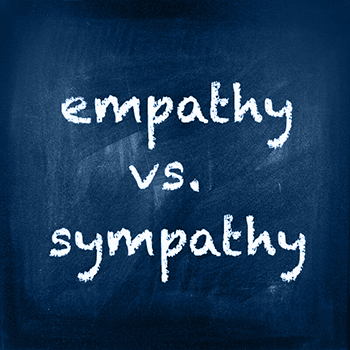The Importance of Empathy Versus Sympathy in Customer Service
Sympathy involves identifying with and even taking on another person’s emotions. A sympathetic response is, “That really makes me angry, too. I promise to fix it.” Empathy refers to acknowledgment and affirmation of another’s emotional state. An empathetic response is, “I can understand why that makes you angry. I’ll do my best to help you find a resolution.”
By David Braun, Help Desk Technician
Many years ago, I participated in training for a call center Customer Service Representative (CSR) position. In this training, supervisors role-played scenarios using real-life examples from calls that had come into the center, illustrating the powerful concept of using empathy versus sympathy in customer encounters. Customers (both internal and external) will have complaints from time to time. It is a CSR’s job to address those complaints with understanding and care (empathy), but not to transfer the customers’ emotional state onto himself (sympathy).
Customers can be impatient, and detail-oriented, and often make demands that are outside of business rules, sometimes employing a variety of threats in order to get their desired result. It can be a very delicate balancing act to take care of those customers while simultaneously professionally representing your company. Therefore it is critical that employees discuss those challenges and be taught the difference between sympathizing and empathizing from a customer service standpoint.
Sometimes customers are correct when pointing out a mistake. Internal mistakes can be highly frustrating, often the result of human error, and easily avoidable. These are the times when it is most important to be empathetic. An angry customer needs someone who will listen and take steps to resolve the situation, but they do not need a proxy. It is important not to be influenced by a sympathetic response, and not to allow the frustration to spread to you and then to others, such as turning sympathetic anger toward co-workers and other customers.
Inexperienced CSRs who have not learned the concepts of empathizing versus sympathizing are more likely to jump on a customer’s emotional roller-coaster. They may make promises they cannot fulfill, make demands of other coworkers, and crusade on the customer’s behalf using the customer’s emotion as fuel. Practicing sympathy rather than empathy as a CSR, chances are higher that the day ends tired and angry, creating bitterness and anxiety that only builds as time goes on.
(Sympathy) “Wow. I can’t believe that we made this kind of mistake. This should never happen. I’m so sorry that you have to deal with this. I promise we’ll get it fixed right away.”
This sympathetic response feels good to the customer. “This rep is really going to bat for me!” But what happens when the final result isn’t what they demanded when the rep is unable to follow through on their promise? This puts the representative is in a very awkward position. Sometimes there are business reasons for a situation being the way it is. What happens when a request is denied? How far do they go to fulfill the promise? At what point do they set aside that emotional entanglement and move on to the next case?
(Empathy) “Thank you for bringing this issue to our attention. I understand how frustrating this kind of thing can be. Please let me do what I can to find out what went wrong and determine the next steps toward a resolution.”
Ultimately, a CSR has a job to do, and that job is to care about customers and to find resolutions that work for everyone, which includes representing and protecting the company’s interests. In that role, taking a sympathetic stance is counter-productive and can lead to broken promises as well as anxiety at having to recant the promises, often leading to an escalation of the issue and further incensed customers.
Understanding empathy versus sympathy can be invaluable in work and personal life. Approaching difficult situations with empathy allows one to show caring and display a higher level of understanding, while at the same time providing freedom and detachment from the hindrance of emotion. A healthy level of detachment (empathy, not apathy!) can make all the difference between a frustrating, difficult situation and just another day at the office.
***
David Braun serves as a key member of the New West Service Team, with over 12 years of experience in customer service for retail and small business. In his free time, David enjoys music and games as well as studying and coaching Brazilian Jiu-Jitsu.

